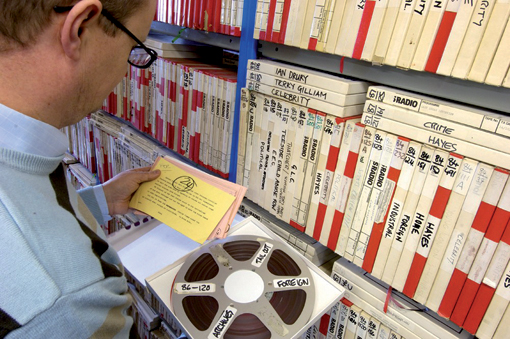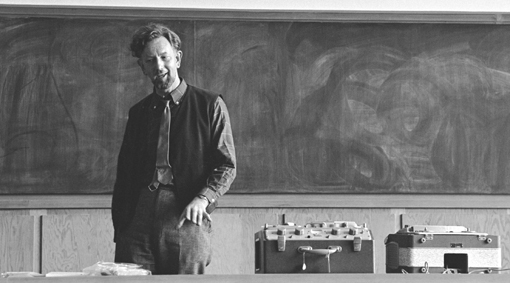Just how prevalent is the use of radio material as an archival primary source and in teaching? Dr. Ieuan Franklin presents new research undertaken by Bournemouth University to gauge the level of academic access to radio archives in the UK.
 About the Author: Dr Ieuan Franklin is a Lecturer in Film and Media Theory at Bournemouth University/Wiltshire College.. He was previously the Research Assistant on the AHRC-funded Channel 4 Television and British Film Culture project. His publications include: ‘Think-Tape : The Aesthetics of Montage in the Post-War Television Documentary ‘, in J. Jacobs and S. Peacock (Eds.), Television Aesthetics and Style (Continuum - forthcoming, 2013) and 'Rambling House and The Barrelman: folklore and audience participation in radio broadcasting in Ireland and Newfoundland' in Across the Water: Irish Journal of Newfoundland and Labrador Research 1(1), 13-32 (2009).
About the Author: Dr Ieuan Franklin is a Lecturer in Film and Media Theory at Bournemouth University/Wiltshire College.. He was previously the Research Assistant on the AHRC-funded Channel 4 Television and British Film Culture project. His publications include: ‘Think-Tape : The Aesthetics of Montage in the Post-War Television Documentary ‘, in J. Jacobs and S. Peacock (Eds.), Television Aesthetics and Style (Continuum - forthcoming, 2013) and 'Rambling House and The Barrelman: folklore and audience participation in radio broadcasting in Ireland and Newfoundland' in Across the Water: Irish Journal of Newfoundland and Labrador Research 1(1), 13-32 (2009).
NB: This is a shorter version of an article that first appeared in the December 2011 issue of Viewfinder.
Before the era of digitisation and rich metadata it was said that it was easier to discover what plays were staged in London in the 1660s than it was to identify the drama transmitted on radio and television in the 1950s. This could not entirely be blamed on the low status which modern popular culture had often been assigned by the ‘Leavisite’ tradition in academia and education, as even the Victorian music hall was better served by reference works than radio and television!
Now it is commonly held that the ‘information society’ will help us to conserve our audio-visual heritage, and there are many researchers and authors that specialize in the history of broadcasting, which is an established subject in education and academia. Someone researching the history of radio nowadays is better served in terms of academic texts and research resources (now including a digital archive of The Listener, and listings from the Radio Times) than ever before. Yet how easy is it for researchers and historians to pursue the opportunity to, in Marvin Bensman’s words, ‘go beyond the printed descriptions to the primary source material of our age’?
Just how prevalent is the use of broadcast materials as an archival primary source, or in teaching? How easy is it to find these materials, and to gain access to them, and what are the current challenges and limitations for someone undertaking this activity? How can access to our audio heritage be facilitated and radically expanded, and what will be the impact of this on education provision and published work?
These are some of the questions posed by an initiative at Bournemouth University to assess the current state of play as regards academic access to radio archives in the UK, and to provide evidence of how radio archives are currently being used in research and teaching. For several months Dr Kristin Skoog and I have been writing a report on this topic, which we hope will identify issues of concern or interest to the archive community, to broadcasting organizations, and to the research/HE community. In doing so we are fortunate to have enlisted the help of the British Library’s Curator of Radio, Paul Wilson.

Matt Holland inspects some of the radio holdings held at Bournemouth University.
Radio’s role in British cultural life British radio has a global reputation, and it has shaped the British people’s view of themselves, providing a constant stream of commentary, opinion, culture, and entertainment. Despite the constant demands made on our attention spans by digital/social media and by television, radio listening is at an all-time high in this country (with 47.3m tuning into at least one station each week according to recent RAJAR figures), and the medium’s flexibility is evident in its migration to new platforms; we now have radio on the Internet, on digital, on free-view television and on mobile phones.
Few aspects of British culture life can be studied properly without reference to the role of radio and the mass media is, and will continue to be, a hugely important source for historians in understanding how people lived. Since the late 1950s there has been a gradual shift away from the notion of culture as synonymous with ‘high culture’, and towards the idea of culture as everyday customs, values, or a ‘way of life’. Radio is indispensable to such a notion of culture because of its ability to amplify or actively shape the everyday interests and aspirations of the British people.
… British radio has a global reputation, and it has shaped the British people’s view of themselves
In terms of education and academia, radio was for a long time a neglected or ‘invisible’ medium, especially compared to film and television. The Radio Studies Network (RSN) has done much since it was founded in 1998 to redress this relative neglect by encouraging research into radio, surveying and sharing best practice in teaching radio and improving radio’s cultural and academic status. However radio studies, as a discipline, has often felt frustrated by the scarcity and inaccessibility of radio ‘texts’. Scholars feel that access to archives would allow the evolution of radio genres and techniques to be traced and that the lack of access has inhibited the growth of theoretical concepts and a critical vocabulary for talking about radio.
Firstly, of course, the inaccessibility of texts is associated with radio’s historical status as an ephemeral medium, and the archival record for at least the first fifty years of British radio is often patchy and inconsistent. This can be attributed to the limited levels of staff time, financial resources, technology and general awareness attached to archiving over the years, and of course examples of off-shore and early commercial radio are as rare as certain areas of early BBC national and regional output. Sometimes radio practitioners have managed to build up their own ‘personal’ archives over the course of extensive careers, which has helped to ‘fill in’ the archival record. The acclaimed producer Charles Parker (see picture) was acutely aware of the importance of archives, keeping recordings and production materials from all of his programmes (which he often used in his work as a peripatetic lecturer), and the Charles Parker Archive, held at Birmingham Central Library, contains a wealth of material of interest to students of broadcasting and vernacular culture.

Radio producer Charles Parker (image: Bournemouth University).
Secondly, there are celebrated radio programmes or broadcasters that students can read about but cannot easily listen to or legally own a copy of. For example, classic BBC radio features such as Olive Shapley’s The Classic Soil (1937) and Louis MacNeice’s The Dark Tower (1946); quotidian output from Radio Caroline in the 1960s; or Independent Local Radio phone-ins from the 1970s. This means that the so-called ‘canon’ of British radio has been shaped by a relatively small published corpus of texts on radio programming, which is ironic given radio’s pre-eminent status as an oral medium! Imagine a student taking a course on 1940s British cinema who could not view The Third Man (1949) or Brief Encounter (1947) in the classroom, in the University Library or in the comfort of her own home, and we begin to get an idea of the problem. The ‘canon’ of radio is, of course, also defined and circumscribed, as I have suggested, by the known (i.e. catalogued and hence visible) archival record.
Teaching about the impact of media on audiences is often best illustrated by a clip of Orson Welles’ legendary War of the Worlds, and teaching radio comedy is facilitated by the widespread circulation of The Goon Show recordings on CD and the availability of scripts in published form. However, those who teach radio production or radio history at degree and post-graduate level are increasingly finding that it is the quotidian, rather than the canonical material, that they desire most. This highlights the wisdom of Asa Brigg’s recommendation (in the 1997 edition of the BUFVC Researcher’s Guide) that, where attempts to preserve everything prove too costly, ‘‘time slices’ of broadcast output can be retained, which may enable people in the distant future to learn far more about ourselves than we have consciously chosen to tell them’.
This reminds us that when we talk of archives we speak of cultural memory. Memory is an active, negotiated process. And like history, as Raphael Samuel reminds us, ‘what it contrives symptomatically to forget is as important as what it remembers’. Memory necessitates ‘selection’; we cannot possibly remember everything, just as it is unrealistic to aspire to archive and preserve all broadcast output in its entirety. So selection remains a crucial issue – and one in which radio scholars should play a key role. Exponential advances in technology and digital storage promise a radical expansion and promotion of the availability of cultural memory. On 1 November Mark Thompson, the then BBC Director General, raised the tantalising prospect in a speech to the 2011 Radio Festival in Salford of,
... a world in which all the content the BBC created was available online and, critically, linked to and shared with numerous partners … a sort of ‘Audiopedia’ that would give listeners access to much of our speech content’.
We might say that we’ve heard all this before; that this dream is constantly deferred, but perhaps radically expanded access is not so far off. In any case it is an auspicious time to be reporting on radio archives.
Dr. Ieuan Franklin